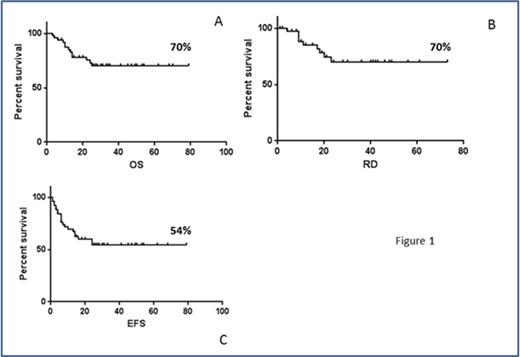Abstract
Backgroung: Anthracyclines-based regimens remain the gold standard for the treatment of Lymphomas, although the associated cardiac toxicity may limit their use, especially in frail and elderly patients.
Patients and Methods: From October 2008 to January 2015 we treated 51 newly diagnosed patients B cell with poor-risk non Hodgkin lymphoma and cardiovascular comorbidities using the R-COMP regimen (rituximab, cyclophosphamide, non-pegylated liposome-encapsulated doxorubicin, vincristine and prednisone). Median age was 72 years (range:46-82 yrs ; 62% ≥ 70 years). As for histology, 26/51 (50%) were Diffuse Large B-cell Lymphoma; 10/51 (20%) Follicular Lymphoma; 8/51 (16%)mantle cell lymphoma; 5/51 (10%) Nodal Marginal Zone Lymphoma; 2/51 (4%) other B-cell indolent Lymphoma. IPI and FLIPI prognostic scores were Intermediate to High in the majority (39/51 = 76%) of the patients. Stage III and IV according to Ann-Arbor staging system was present in 40/51 patients (78%). The median age adjusted Charlsons comorbidity index was 6 (range: 3 to 11). Cardiovascular risk factors were considered: hypertension (39/51pts = 76%), a history or recent acute myocardial infarction (9/51 pts = 17%) and Atrial fibrillation (4/51 = 8%). According to National Institute of Aging/National Cancer Institute (NIA/NCI index), a large portion of patients (39%) presented high-impact conditions mainly consisting of ischemic and arrhythmic diseases, under active treatment. Treatment was well tolerated and toxicities were limited grade III/IV cytopenia.
RESULTS: Complete remission was achieved in 37/51 (72%) and partial response in 8/51 (15%). The remaining 12% of patients had a progressive disease . As of July 2015, after a median follow up period of 25 months (range 3-79), the OS, RD, EFS, TTF were not reached ( Figure 1, panel A,B,C respectively). In particular, at 5 years from the treatment starting, OS and RD are both 70% and EFS is 54% .Cardiac toxicity was observed in one patients who died for pulmonary edema, while two patients developed arrhythmias.
Conclusions: This study confirm the efficacy and tolerability of R-COMP regimen in elderly patients with cardiovascular comorbidities.
No relevant conflicts of interest to declare.
Author notes
Asterisk with author names denotes non-ASH members.


This feature is available to Subscribers Only
Sign In or Create an Account Close Modal